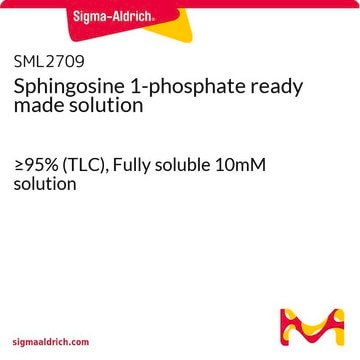SRP0191
Sphingosine-1-phosphate lyase1 Active human
recombinant, expressed in baculovirus infected insect cells, ≥70% (SDS-PAGE)
Synonym(s):
SGPL1, SP-lyase 1, hSPL
Sign Into View Organizational & Contract Pricing
All Photos(1)
About This Item
UNSPSC Code:
12352200
NACRES:
NA.32
Recommended Products
biological source
human
recombinant
expressed in baculovirus infected insect cells
Assay
≥70% (SDS-PAGE)
form
aqueous solution
mol wt
57.5 kDa
packaging
pkg of 10 μg
storage condition
avoid repeated freeze/thaw cycles
concentration
0.19 mg/mL
NCBI accession no.
UniProt accession no.
shipped in
dry ice
storage temp.
−70°C
Gene Information
human ... SGPL1(8879)
General description
SGPL1 (sphingosine-1-phosphate lyase 1) is an ER (endoplasmic reticulum) enzyme which shows a wide level of tissue expression. This protein is composed of putative 568 amino acids, and has a molecular weight of 63.5kDa. This enzyme is a member of the pyridoxal 5′-phosphate-dependent carbon-carbon lyases, which form a subclass of aldehyde lyases. It is a type III membrane protein, also known as type I membrane protein which lacks a cleavable N-terminal signal sequence. The single transmembrane segment is in proximity to the N-terminal which faces the ER lumen. The catalytic region faces the cytoplasm.
Application
Useful for the study of biochemical function.
Biochem/physiol Actions
SGPL1 (sphingosine-1-phosphate lyase 1) enzyme is involved in the synthesis of long-chain aliphatic aldehydes which occurs during several metabolic processes, such as peroxisomal α-oxidation of 3-methyl-branched fatty acids and 2-hydroxy long-chain fatty acids, microsomal oxidation of long-chain alcohols, prenylated protein degradation in the lysosomes, microsomal degradation of phosphorylated sphingoid bases, attack of plasmalogens by myeloperoxidase (MPO)-derived hypochlorous acid, and degradation of (lyso)plasmalogens in the microsomes.s This protein shows reduced expression in OSCC (oral squamous cell carcinoma), colon and prostate cancers, and this is associated with poor prognosis.
Physical form
Formulated in 25 mM Tris-HCl, pH 8.0, 100 mM NaCl, 0.05% Tween-20, 10% glycerol, 3 mM DTT, 0.5 mM pyridoxal 5′ phosphate monohydrate.
Preparation Note
Thaw on ice. Upon first thaw, briefly spin tube containing enzyme to recover full content of the tube. Aliquot enzyme into single use aliquots. Store remaining undiluted enzyme in aliquots at -70°C. Note: Enzyme is very sensitive to freeze/thaw cycles.
Storage Class Code
12 - Non Combustible Liquids
WGK
WGK 1
Flash Point(F)
Not applicable
Flash Point(C)
Not applicable
Certificates of Analysis (COA)
Search for Certificates of Analysis (COA) by entering the products Lot/Batch Number. Lot and Batch Numbers can be found on a product’s label following the words ‘Lot’ or ‘Batch’.
Already Own This Product?
Find documentation for the products that you have recently purchased in the Document Library.
Sphingosine 1-phosphate lyase deficiency disrupts lipid homeostasis in liver.
Bektas M, et al.
The Journal of Biological Chemistry, 285(14), 10880-10889 (2010)
Aberrant expression of the S1P regulating enzymes, SPHK1 and SGPL1, contributes to a migratory phenotype in OSCC mediated through S1PR2.
Patmanathan SN, et al.
Scientific Reports, 6:25650 (2016)
Sphingosine 1-phosphate lyase, a key regulator of sphingosine 1-phosphate signaling and function.
Serra M and Saba JD
Advances in Enzyme Regulation, 50(1), 349-362 (2010)
Serena Mezzar et al.
Journal of lipid research, 55(3), 573-582 (2013-12-11)
Long-chain aldehydes are commonly produced in various processes, such as peroxisomal α-oxidation of long-chain 3-methyl-branched and 2-hydroxy fatty acids and microsomal breakdown of phosphorylated sphingoid bases. The enzymes involved in the aldehyde-generating steps of these processes are 2-hydroxyacyl-CoA lyase (HACL1)
Our team of scientists has experience in all areas of research including Life Science, Material Science, Chemical Synthesis, Chromatography, Analytical and many others.
Contact Technical Service






